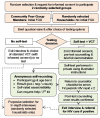The uptake and accuracy of oral kits for HIV self-testing in high HIV prevalence setting: a cross-sectional feasibility study in Blantyre, Malawi
- PMID: 21990966
- PMCID: PMC3186813
- DOI: 10.1371/journal.pmed.1001102
The uptake and accuracy of oral kits for HIV self-testing in high HIV prevalence setting: a cross-sectional feasibility study in Blantyre, Malawi
Abstract
Background: Although HIV testing and counseling (HTC) uptake has increased dramatically in Africa, facility-based services are unlikely to ever meet ongoing need to the full. A major constraint in scaling up community and home-based HTC services is the unacceptability of receiving HTC from a provider known personally to prospective clients. We investigated the potential of supervised oral HIV self-testing from this perspective.
Methods and findings: Adult members of 60 households and 72 members of community peer groups in urban Blantyre, Malawi, were selected using population-weighted random cluster sampling. Participants were offered self-testing plus confirmatory HTC (parallel testing with two rapid finger-prick blood tests), standard HTC alone, or no testing. 283 (95.6%) of 298 selected adults participated, including 136 (48.0%) men. 175 (61.8%) had previously tested (19 known HIV positive), although only 64 (21.5%) within the last year. HIV prevalence was 18.5%. Among 260 (91.9%) who opted to self-test after brief demonstration and illustrated instructions, accuracy was 99.2% (two false negatives). Although 98.5% rated the test "not hard at all to do," 10.0% made minor procedural errors, and 10.0% required extra help. Most participants indicated willingness to accept self-test kits, but not HTC, from a neighbor (acceptability 94.5% versus 46.8%, p = 0.001).
Conclusions: Oral supervised self-testing was highly acceptable and accurate, although minor errors and need for supervisory support were common. This novel option has potential for high uptake at local community level if it can be supervised and safely linked to counseling and care.
Conflict of interest statement
The authors have declared that no competing interests exist.
Figures
Comment in
-
HIV self-testing and the missing linkage.PLoS Med. 2011 Oct;8(10):e1001101. doi: 10.1371/journal.pmed.1001101. Epub 2011 Oct 4. PLoS Med. 2011. PMID: 21990965 Free PMC article.
References
-
- Odhiambo J, Kizito W, Njoroge A, Wambua N, Nganga L, et al. Provider-initiated HIV testing and counselling for TB patients and suspects in Nairobi, Kenya. Int J Tuberc Lung Dis. 2008;12:63–68. - PubMed
-
- Topp SM, Chipukuma JM, Giganti M, Mwango LK, Chiko LM, et al. Strengthening health systems at facility-level: feasibility of integrating antiretroviral therapy into primary health care services in Lusaka, Zambia. PLoS One. 2010;5:e11522. doi: 10.1371/journal.pone.0011522. - DOI - PMC - PubMed
-
- Lugada E, Levin J, Abang B, Mermin J, Mugalanzi E, et al. Comparison of home and clinic-based HIV testing among household members of persons taking antiretroviral therapy in Uganda: results from a randomized trial. J Acquir Immune Defic Syndr. 2010;55:245–252. - PubMed
-
- Negin J, Wariero J, Mutuo P, Jan S, Pronyk P. Feasibility, acceptability and cost of home-based HIV testing in rural Kenya. Trop Med Int Health. 2009;14:849–855. - PubMed
Publication types
MeSH terms
Substances
Grants and funding
LinkOut - more resources
Full Text Sources
Medical



